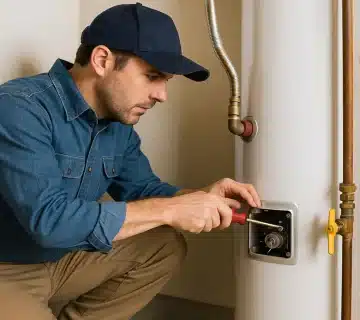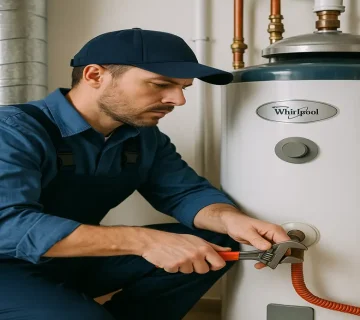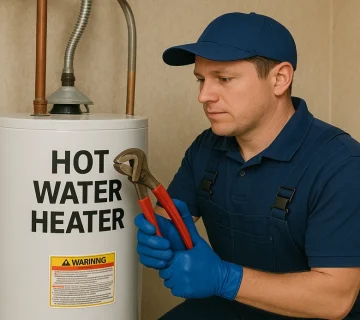Replace water heater when you notice any of these key signs. Water heaters are an essential part of your home, providing hot water for showers, dishes, laundry, and more. However, like all appliances, they don’t last forever. Recognizing the early warning signs can help you avoid unexpected breakdowns and costly repairs. In this article, we’ll explore five critical signs that indicate it’s time to replace your water heater.
1. Inconsistent Water Temperature: A Sign to Replace Water Heater
One of the most noticeable signs that you need to replace water heater is inconsistent water temperature. If the water fluctuates between hot and cold or you run out of hot water more quickly than usual, it’s a clear indication that your water heater is having trouble keeping up.
Over time, the internal components of the heater can degrade, leading to uneven heating or total failure. If these issues are persistent, the problem likely lies with the heating element or a buildup of sediment in the tank. In either case, it’s time to consider replacing your water heater.
2. Strange Noises Coming from the Heater
Another telltale sign that it’s time to replace your water heater is when strange noises like rumbling, popping, or hissing start coming from the unit. These sounds are usually caused by sediment buildup at the bottom of the tank, where minerals accumulate over time.
As the water heater heats up, the sediment can trap water underneath, causing it to overheat and create noise. While flushing the tank might temporarily alleviate the noise, if the problem persists, it may indicate that the internal components are deteriorating. Replacing your water heater is the best option to avoid further damage and potential failure.
3. Water Leaks Around the Heater
Water leaks around the heater are one of the most serious signs that it’s time to replace water heater. If you notice pooling water around the unit, it could mean there is a leak in the tank, which is a sign of corrosion. Over time, the constant heating and cooling of the water can cause the tank to weaken, leading to cracks and leaks.
Water leaks can cause significant damage to the surrounding area, leading to costly repairs to both the water heater and the surrounding flooring or walls. If you see water pooling near your unit or notice rust around the tank, it’s time to replace your water heater before it leads to more extensive damage.
4. Age of the Water Heater: How Long Should It Last?
The age of your water heater plays a crucial role in determining whether it’s time to replace water heater. Traditional tank-style water heaters usually last around 10 to 15 years, while tankless models can last up to 20 years or more.
If your water heater is getting close to this age or older, it’s time to start thinking about replacing it. While some water heaters may continue to work for a little longer, the risk of breakdowns increases as the unit ages. Continuing to run an old water heater can result in higher energy costs due to reduced efficiency, as well as more frequent repairs. If your water heater is reaching the end of its lifespan, replacing it will provide better reliability and energy savings.
5. Rusty or Discolored Water
If you notice rusty or discolored water when using hot water, it’s a strong sign that your water heater is beginning to deteriorate. This usually occurs when the inside of the tank starts to rust. A rusty tank not only contaminates your water but also signals that the unit is no longer functioning properly.
Even if you flush the tank, it may not solve the underlying issue. If the water continues to be discolored or you notice a metallic taste, it’s time to replace your water heater to ensure the safety and quality of your water.
Conclusion: Time to Replace Water Heater
Recognizing the signs that it’s time to replace water heater can help you avoid major inconveniences and prevent costly repairs. Water heaters typically have a lifespan of 10 to 15 years, and if your unit is older than that, it may be more cost-effective to replace it rather than continue repairing it.
Addressing issues like inconsistent water temperature, strange noises, water leaks, and discolored water early on can prevent further damage to your home and ensure you always have reliable hot water. Don’t wait until your water heater completely breaks down. If you notice any of the warning signs mentioned above, it’s a good idea to call in a professional to inspect your unit and replace it if necessary.
Upgrading to a new, energy-efficient water heater can save you money on utility bills and provide peace of mind knowing that your home’s hot water needs are met.
For more information about replacing your water heater, visit our website, check out our Google Maps link, explore our Bing location, see our Yahoo Local listing, or explore our Yelp page for customer reviews.





